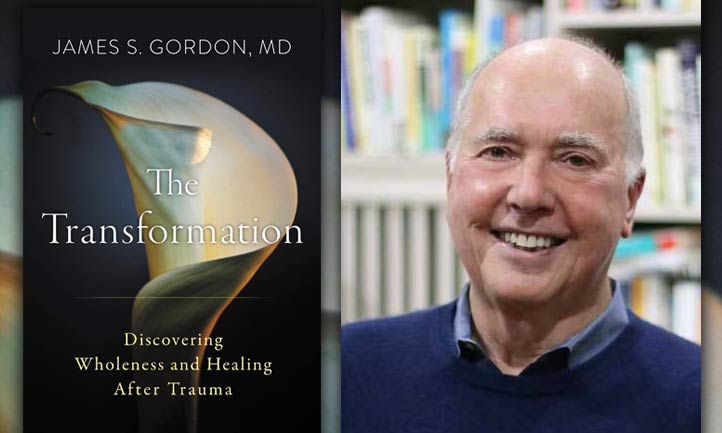'The Transformation': Book offers practical ways to heal after trauma
Author: Lalaine Estella
“The Transformation: Discovering Wholeness and Healing After Trauma,” by James Gordon, MD, is available on Smile.Amazon.com. If you select TAPS - Tragedy Assistance Program for Survivors as your designated charity, a portion of sales of all products go to support TAPS programs.
You could look at Dr. James Gordon’s new book, “The Transformation,” as an overview of 50-years of work in the field of psychological trauma. With 22 chapters covering biology, dieting, emotional triggers, family history and finding our life’s purpose, it is not light reading.
But if you’ve met Gordon at one of his workshops at a TAPS seminar, or attended one of his webinars hosted by the TAPS Institute for Hope and Healing, you know that he’s friendly, approachable and has a very direct manner of speaking. He writes in very much the same way, making this book an easily digestible manual for bringing balance in your life after trauma.

“The Transformation” includes practical, step-by-step exercises you can try at home at any time. Have 10 minutes? Try one of his breathing techniques that has been shown to help people “feel calmer, happier, more stable, more present, and more hopeful.”
The exercises, “prescriptions” and guidelines Gordon presents are firmly grounded in science and draw from his medical career in the clinic, at the highest levels of government, in the classroom and on the field. He founded the Center for Mind-Body Medicine (CMBM) in 1991, focusing his work on using the connection between the mind and body to repair psychological and emotional injuries — from loss, war, illness, assault, natural catastrophes and more. For 20 years he’s also been teaching active duty and veteran populations a whole health approach to resiliency and coping with trauma. Many of these techniques, which he developed and refined with his staff at CMBM, are in the book.
“For the approaches that we’re using and that we teach, there is plenty of good research on their effectiveness and why it works on biological and psychological levels,” Gordon says. “We want them to be available to everybody.”
The book includes anecdotes and stories from around the world that illustrate what he does best — teach coping mechanisms to those who are stressed and traumatized. In Macedonia, for example, he taught 200 refugees how to literally and figuratively start to shake off the weight of their grief. “I know that some of you feel weak and stiff in your body, unable to act or even feel. … We’re going to do something now that will shake loose the tension of your fight or flight and help melt your frozen body. It may help you get rid of some of your anger, raise your energy a little, maybe even lift off some of the troubles that weigh down your minds.” He then describes in detail an “expressive meditation” that our ancestors used to do; it is a physical exercise he calls Shaking and Dancing that you can try too.
“I’m not saying you have to do everything in the book,” Gordon says. “My invitation is to try it. There is little to lose and potentially a great deal to gain.”
Gordon’s book focuses on natural, whole body engagement in helping to alleviate stress. It offers information grounded in science that show how are bodies are affected by trauma and how we can, through simple adjustments and exercises, re-energize our bodies to help deal with grief and trauma. He encourages the reader to explore what techniques will resonate. “You be the one who decides. That’s crucially important to all of us — to help ourselves in our own self-healing.”
Gordon’s Washington, D.C.-based CMBM is a worldwide leader in training health professionals, educators and community leaders in its model of self-awareness, self-care and group support to heal. As a member of the TAPS Advisory Board, he is no stranger to the heartache survivors face after the loss of a loved one.
“I feel such a kinship with TAPS and the survivors and with what Bonnie (Carroll) is doing,” Gordon says. “We’ve got a healing community and I hope this book can be used as a manual for recovering from and moving through trauma. I hope it will be an ongoing companion.”
UPCOMING WEBINARS
Dr. James Gordon leads two live webinars this fall that will offer safe, practical ways to move beyond trauma that comes with the loss of those we love. The webinars are presented by the TAPS Institute for Hope and Healing and Boeing.
-
Finding Wholeness After Trauma
September 24, 2019, 12 to 1:30 p.m. Eastern
This event is free and open to the public. Registration is required to participate. -
Providing Hope and Healing to Those Coping with Trauma and Loss
October 29, 2019, 12 to 1:30 p.m. Eastern
This event is free and open to the public. Content is focused toward bereavement professionals and clinicians to guide them in creating programs that integrate self-care and group support. Continuing education credit is available.
